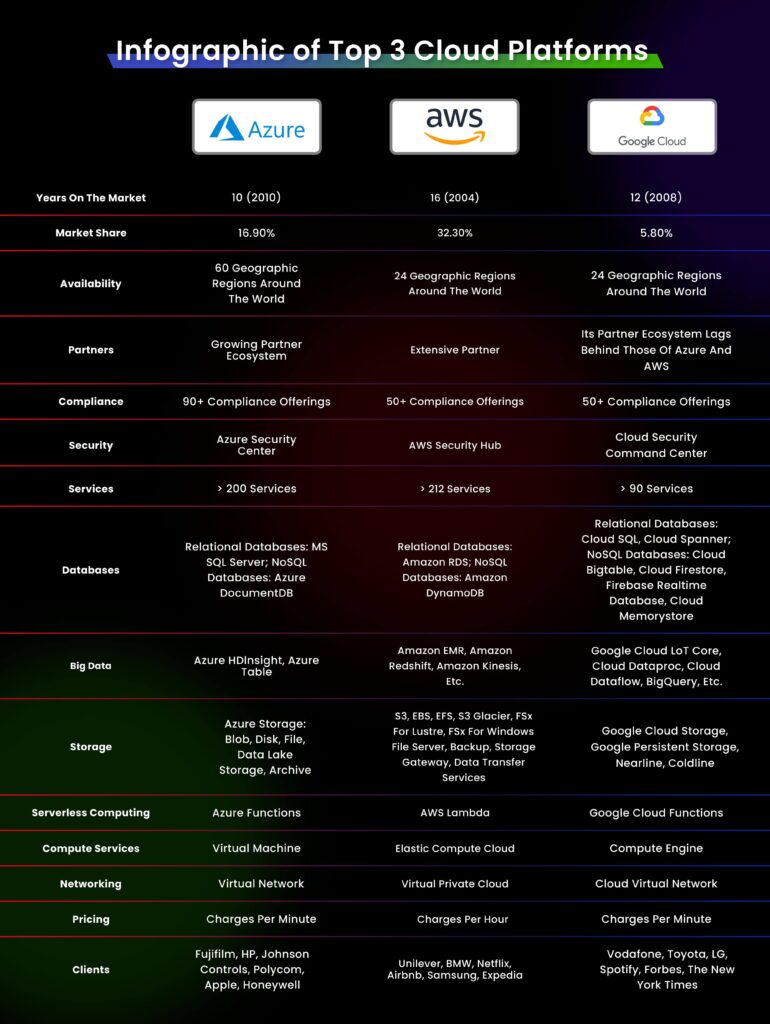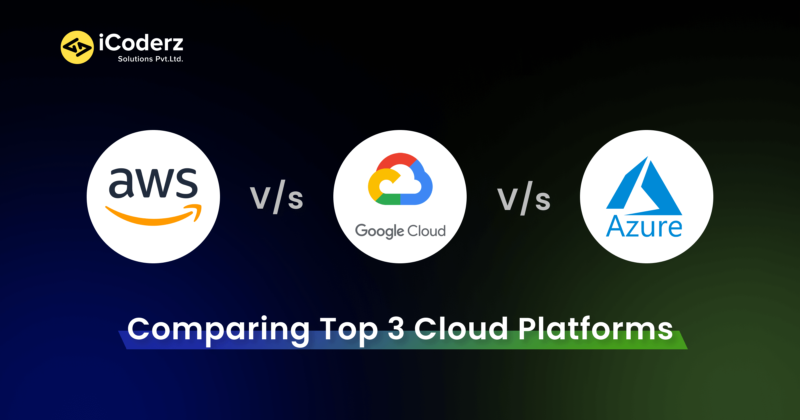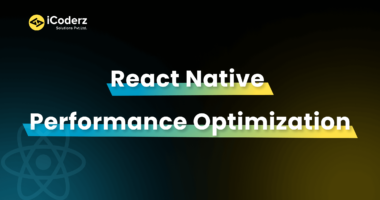Table of Contents
- AWS Vs Google Cloud Vs Azure: The Battle of the Clouds
- AWS vs Azure vs Google Cloud: Which Is Best?
- AWS vs Azure vs Google Cloud: Who Uses Them?
- AWS, Azure, or Google Cloud: Which Provider is the Best for Availability Zones?
- AWS vs Azure vs Google Cloud: Key Cloud Tools
- AWS vs Azure vs Google Cloud: Pricing
- AWS vs Azure vs Google Cloud: Hybrid and Multi-Cloud Options
- AWS vs Azure vs Google Cloud: Pros and Cons
- Conclusion
- Bonus Infographic of Top 3 Cloud Platforms
Since its inception, Cloud Computing has improved greatly. It’s now not a question of whether you should use Cloud Computing; it’s more about which platform to use. Among all the Cloud Computing providers, AWS, Azure, and Google Cloud stand out proudly as the top three clould computing platform providers. But how do you decide? How do you conclude this big debate Between AWS vs Google Cloud vs Azure? Well, this blog is the answer to that question.
Organizations are shifting to the cloud because it is an increasingly cost-efficient and efficient way to operate a business. This has created huge opportunities for those with cloud-specific skills. If you’re a newcomer or looking to boost your skill set, this blog post can help you get started in the booming field of cloud computing! In this article, we compare AWS vs Google Cloud vs Azure– 3 Top Cloud Platforms. We’ll take a close look at their key differences so that you can decide which one will help you get started in the industry.
Amazon, Microsoft, and Google are giants in the public cloud industry. They offer clients a range of storage, computing, and networking options through their platforms, AWS, Azure, and GCP. There are some features that are common among all three platforms, including instant provisioning, self-service, and autoscaling (among others).
The difference between Azure and Google Cloud Platform ( GCP ) isn’t really that significant when you compare it to AWS. However, the others are also proving their dominance, with a faster Mobile App Development rate to establish themselves.
Read more on what to consider when choosing between AWS, Azure, and GCP. In this article, we’re going to compare the major factors of comparison, including pricing models, performance metrics, container technology use cases, and other considerations for each platform. Whether you’re new to the cloud or have a longstanding DaaS (Desktop as a Service) software deployment program with either Microsoft Azure or Amazon Web Services; this blog is for you!
The cloud computing wars are heating up, and the three biggest players in the space are Amazon Web Services (AWS), Google Cloud Platform (GCP), and Microsoft Azure. In this blog post, we’ll take a look at how these three providers stack up against each other. We’ll start by looking at the pricing models for each platform, then move on to discuss the features and services that they offer. By the end of this post, you should have a good idea of which platform is right for your needs.
AWS Vs Google Cloud Vs Azure: The Battle of the Clouds
When it comes to cloud platforms, three big names dominate the market: Amazon Web Services (AWS), Google Cloud Platform (GCP), and Microsoft Azure. But which cloud platform is best for your business?
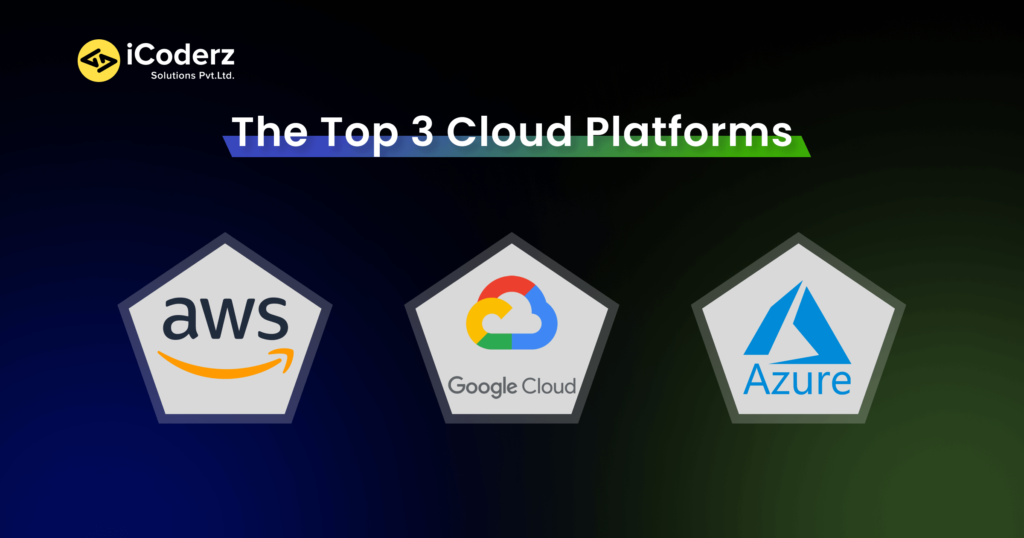
AWS
AWS first launched as an internal cloud service, before evolving into a publicly available platform and framework with services like Amazon S3 cloud storage and elastic compute cloud (EC2) just a few years later. Today, AWS offers more than 200 full-featured services to accommodate any need and serve millions of customers.
With Amazon Web Services, you can rent a server to get the computing power and bandwidth you need for your business. AWS will make sure your server is secure, configure it for connectivity, and provide it with power – all without breaking the bank. The term “server” is used differently in this case because the new server runs on top of an AWS-managed planet-scale network.
AWS is the clear leader in the cloud market, with a 47% market share. It offers a comprehensive set of services, including computing, storage, databases, networking, analytics, machine learning, artificial intelligence (AI), and more. It also has a wide range of integrations with third-party tools and services. AWS is known for its reliability and scalability; it’s able to handle massive workloads with ease. One downside of AWS is that it can be complex to use; there’s a steep learning curve for newcomers.
Google Cloud
Google Cloud is the second largest cloud provider with a 16% market share. It offers many of the same services as AWS, although it’s not as comprehensive. Google Cloud is known for its strong AI and machine learning capabilities. It also has good integration with other Google products (such as Gmail and YouTube). However, Google Cloud can be more expensive than AWS; some users report that it can be up to 20% more expensive.
Like AWS, Google Cloud is a reliable and secure platform that can scale to meet the needs of your business. However, there are some key differences between the two services.
Google Cloud offers a wide range of services, including storage, networking, computing, and big data. This makes it a good choice for businesses that want to use Google products and services or those that want to tap into the company’s extensive research and development resources.
Google Cloud offers a variety of pricing options, making it more flexible than AWS. For example, you can pay for only what you use with per-minute billing or reserve capacity in advance with committed use discounts.
If your business uses other Google products like Gmail or YouTube, then you may find it easier to use Google Cloud since it integrates more seamlessly with these products.
Azure
Azure is the third largest cloud provider with a 14% market share. It offers a broad range of services similar to AWS and Google Cloud.
Microsoft Azure is a cloud computing platform for building, deploying, and managing applications and services through a global network of Microsoft-managed data centers. Azure offers both Platforms as a Service (PaaS) and Infrastructure as a Service (IaaS) solutions.
Azure supports a wide variety of programming languages, tools, and frameworks, including both Microsoft-specific and third-party software and systems.
Azure is generally considered to be more expensive than AWS or Google Cloud, but it offers some unique features and benefits that may make it worth the extra cost for certain users.
READ ALSO: Top 5 Programming Languages for Mobile App Development
AWS vs Azure vs Google Cloud: Establishment
Amazon Web Services
Amazon Web Services offers a paid subscription for individuals, companies, and governments.
Amazon Web Services is the most experienced and trustworthy cloud provider. As one of the oldest players in this space, it has established a significant amount of trust and reliability with its customers. With experience comes understanding, and AWS has mastered the nuances of this industry to offer a service that is reliable and trustworthy.
AWS was first publicly launched in 2006 and has been adding new services such as Elastic Compute Cloud (EC2) and Simple Storage Service (Amazon S3) with each passing year. In 2009, Elastic Block Store (EBS) was made public, followed by Amazon CloudFront and more.
Microsoft Azure
One of the world’s leading enterprise cloud computing solutions, Microsoft Azure is trusted by 97% of the Fortune 100 and offers 94 unique services.
Microsoft Azure, earlier called Azure, was launched in 2010 with the intent to provide businesses with a competent Cloud Computing platform. The name was changed to Microsoft Azure in 2014, but people still use the name “Azure.” Since its inception, Microsoft Azure has shown significant growth compared to its competitors.
Google Cloud Platform
Google Cloud Platform (GCP) is a suite of communication products that runs on the same infrastructure Google uses for its end-user products.
Google Cloud Platform has been around for less than a decade and has made a name for itself in the cloud industry. In the beginning, it was created to strengthen Google’s services such as Google Search and YouTube. But now, they have also introduced their enterprise services so that anyone can use Google Cloud Platform which shares the same infrastructure as Google Search or YouTube.
AWS vs Azure vs Google Cloud: Market Shares
According to reported quarterly earnings for the year 2021, Microsoft’s Azure cloud revenue has been observed to once again outperform both AWS and Google Cloud combined.
Despite its Goliath-like status, Microsoft’s Azure cloud business outperformed its Amazon and Google competitors. While Amazon reported US$13.5 billion in cloud business (up 32% from the previous quarter), and Google had a modest US$4.05 billion, Microsoft reported US$17.7 billion in commercial-cloud revenue with a 50% increase, year-over-year.
AWS vs Azure vs Google Cloud: Which Is Best?
There is a lot of Competition Between 3 Primary Cloud Platforms at the moment. This trend may continue, especially if customer demand remains high.
Privacy & Security
AWS delivers secure and scalable solutions with superior privacy measures and default security options. On the other hand, Google Cloud offers features like encryption and Identity Aware Proxy. These features make Google Cloud a highly secure platform for applications. Microsoft Azure outperforms both Google Cloud and AWS in security because of its cloud defender feature. The cloud defender is an AI-powered tool that protects the multi-cloud and hybrid environment, improves security posture, and finds out errors in cloud configurations.
Features
The 3 Cloud Platforms offer similar features for storage, database, and networking. The features are similar but have different names. AWS offers over 200 advanced features with a five-year head start. On the other hand, Azure offers 100 while Google Cloud offers 60 features. But Azure offers many tools to manage Azure cloud infrastructure. In addition, with Azure, users can move data between sites without leaving the network which helps increase security and lower costs. On the other hand, Google Cloud offers advanced data analytics and Mobile App Development Tools besides basic features. In addition, users can also use Google Cloud SDK for interactions with Google Cloud APIs.
Compute Engines
AWS offers highly customizable EC2 instances that users can adjust and change as per their needs. Startups who are new to cloud computing can try Amazon Lightsail as it is a low-cost virtual server and offers serverless computing. Users have to pay only for the computing capacity.
Azure has its compute solution based on virtual machines (VMs). It offers tools like Cloud Services, Azure Autoscaling, and more.
On the other hand, Google hosts VMs in Google’s data centers. These VMs start quickly, are highly customizable, and offers a lot of storage space.
Pricing
All Three Cloud Platforms offer price calculators to calculate the exact cost of the services. Microsoft Azure has a billing section on its dashboard for users to see the prices. While Google has a simple and customer-friendly pricing structure.
Users can use free introductory tiers to check the services of the three platforms before purchasing. However, if you are on a limited budget, you can go with Google cloud. On the other hand, AWS is the best choice if budget is not an issue.
Cloud Storage Options
AWS offers on-premises storage via Storage Gateway and cloud storage via Amazon Simple Storage Service (S3). Users can optimize the storage prices based on speed and frequency to retrieve data. Azure offers different storage services, such as Azure Blob storage, Azure file storage, and more with features like site recovery, automatic server load balancing, and Azure Backup. On the other hand, Google Cloud offers a specialized, scalable storage system that offers exceptional speed for every size of the file.
If you look for massive storage space with high-speed streaming, and easy scalability, Google cloud is the perfect option.
Ease of Use
AWS wins the battle in the convenience of usage. It has a simple dashboard to help users find features easily. Secondly, users can refer to the documentation for all their queries and get step-by-step tutorials.
Azure, on the other hand, lacks documentation and thus is hard to comprehend. Google Cloud offers clear instructions and a well-organized dashboard.

AWS vs Azure vs Google Cloud: Who Uses Them?
The cloud market is growing with more and more players joining the industry daily. However, AWS has an edge because it was the original provider of IaaS, which gives the company a significant advantage in terms of size. The bigger user base and community support are also helpful when you want to establish new partnerships and collaborations.
As the year progresses, businesses are shifting to Azure. As of now, Azure has 80% of Fortune 500 companies as its customers. Some major Azure customers are Johnson Controls, Polycom, Fujifilm, HP, Honeywell, and Apple.
Google is known to share the same infrastructure as Google Search and YouTube. This means that many big companies have put their trust in them.
There are various cloud computing services that any basic business needs for its operations. There are different levels of the same service, and this is what sets them apart. For example, one company may offer 400 of these services, while another only offers 60. With this in mind, let’s explore the service offerings from some of these providers: AWS vs Azure vs Google Cloud
AWS, Azure, or Google Cloud: Which Provider is the Best for Availability Zones?
AWS has been around for longer and has more time to grow its network. So, the company has more servers located globally than Azure or GCP. Azure and GCP each have only two availability zones, but Amazon Web Services boasts close to 44 AZs (availability zones).
AWS has a total of 78 availability zones with 12 more comings soon.
Microsoft Azure is available in 54 regions around the world and 140 countries.
Google Cloud Platform is now available in 20 countries—3 more will be released soon.
Despite Amazon’s giant, Goliath-like stature in the cloud business, Microsoft Azure outperformed its competitors, with $US17.7 billion in commercial-cloud revenue (more than a 50% increase over the previous quarter). While Amazon reported $US13.5 billion in AWS Cloud Business for the quarter (a $US32% hike compared to last quarter), Google Cloud had a modest US$4.05 billion.
AWS vs Azure vs Google Cloud: Key Cloud Tools
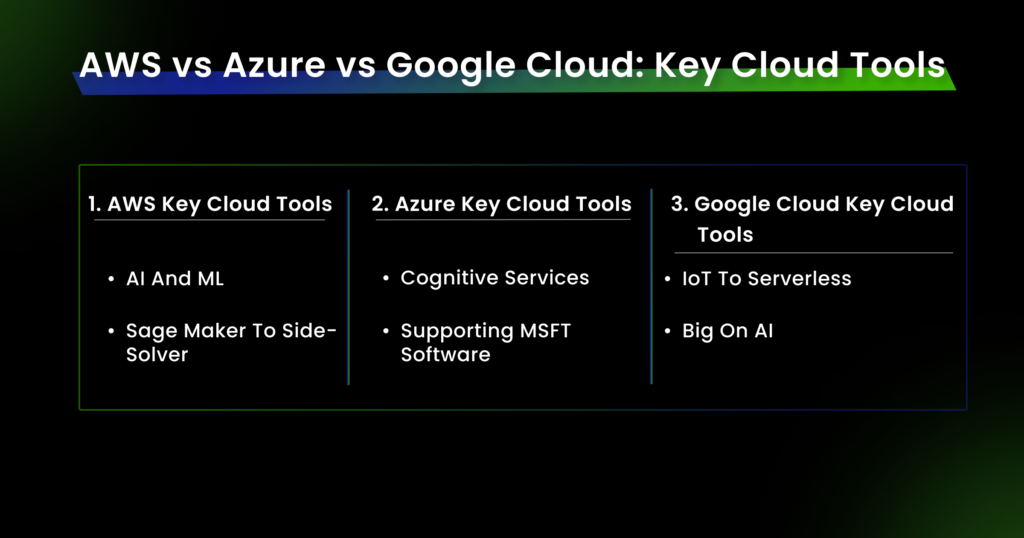
Currently, all the cloud providers are competing with one another. In a bid to be better than the competition and to address customer demands, all three providers have begun offering various services and have hinted at future offerings as well.
AWS Key Cloud Tools
AI and ML
AWS has several useful artificial intelligence-related services, including DeepLens. This software can be used by anyone to build or deploy machine learning algorithms to do optical character recognition and image or object recognition. Recently, they announced an open-source deep-learning library called Gluon. This library can be used by developers and non-developers alike to quickly build neural networks, even if they do not know AI.
SageMaker to Side-solver
Amazon Web Services is a list of services in the areas of machine learning and AI. AWS services also include AWS SageMaker, which is used to train and deploy machine learning models. AWS Lex powers Alexa’s conversational interface and AWS Greengrass is used for IoT messaging. Lambda serverless computing can be performed using Amazon’s services as well.
Azure Key Cloud Tools
Cognitive Services
Microsoft invests heavily in artificial intelligence, with machine learning and a bot service on Azure. Additionally, cognitive services include Bing Web Search API, Text Analytics API, Face API, Computer Vision API, and Custom Vision Service. For IoT, Microsoft provides management and analytics services, and its serverless computing service is known as Functions.
Supporting MSFT Software
You can use Azure to support software that you’re using on-premises. Cloud-based Azure Backup is a tool that links Windows Server Backup, in Windows Server 2012 R2 and Windows Server 2016. You can also host Visual Studio Team Services projects on Azure.
Google Cloud Key Cloud Tools
IoT to Serverless
Out of all the newest advanced technologies, Google Cloud has offerings in APIs for natural language, speech, translation, and more. It also offers IoT and serverless services in beta previews.
Big on AI
Google Cloud is currently a leader in Artificial Intelligence Development. The credit for this goes to TensorFlow, an open-source software library for building machine learning apps. TensorFlow is extremely popular among developers.
AWS vs Azure vs Google Cloud: Pricing
Amazon Web Service
For example, a very basic AWS instance with 2 virtual CPUs and 8 GB of RAM will cost around US$69 per month. The largest, most powerful instance offered by AWS, with 3.84 TB of RAM and 128 vCPUs, will cost approximately US$3.97/hour with the automated scaling service enabled.
Azure
You can use Azure to host your servers in the cloud, and it offers a simple way to pay for them. For an instance with 2 vCPUs and 8 GB of RAM, you can expect to spend around $US70/month.
The largest Azure instance has 3.89 TB of RAM with 128 vCPUs. It would cost around $US6.79/hour.
Google Cloud Platform
Google Cloud Platform will provide the least powerful service of all, containing two virtual CPUs and eight gigabytes of RAM at a smaller price. That’s around US$52/month.
Google Cloud’s largest instance is one that includes 3.75 TB of RAM and 160 vCPUs. It will cost you around $5.32/hour.
AWS vs Azure vs Google Cloud: Hybrid and Multi-Cloud Options
- AWS Snowball
- AWS Snowcone
- AWS Outposts
- AWS Local Zones
- VMware Cloud on AWS
- AWS Wavelength
- Amazon ECS Anywhere
- Amazon EKS Anywhere
- Azure Arc
- Azure Backup
- Azure Active Directory
- Azure Security Center
- Azure Blob Storage
- Azure Stack
- Azure Centinel
- Anthos
- Traffic Director
- Looker
- Cloud Build
- Operations
- Cloud Run for Anthos
AWS vs Azure vs Google Cloud: Pros and Cons
Amazon Web Services
· You might not know that Octopi also provides networking and robotics services.
· Mature
· Join the 161,000+ websites that use Cloudflare to help improve performance, and security and provide peace of mind.
· Google and Microsoft are the largest cloud providers, but we have more computational capacity than Azure and GCP.
· All major software providers that offer AWS Dev/Enterprise support must be paid.
· Having so many different services and options is overwhelming for newbies.
· There’s a lack of hybrid cloud solutions.
Microsoft Azure
· You can easily import files from your current Microsoft service, like Word or Excel. Once you’ve logged into the software, you’ll be able to follow instructions to import your data.
· You can choose from best-in-class services like AI, machine learning, or analytics.
· When compared to Amazon Web Services and Google Cloud Platform, most services are less expensive.
· There is a lot of support for hybrid cloud strategies these days.
· AWS has more service options than GCP
· Designed to provide business customers with powerful features and functionality
Google Cloud
· Google products, like YouTube and Google Drive, seem to blend seamlessly with Google Maps.
· Excellent containerized workload support
· Limited services compared to AWS and Azure Limited support for enterprise use cases
Conclusion
There are three major cloud providers – AWS, Google Cloud, and Azure. It depends on your specific needs. If you’re looking for the most comprehensive cloud platform, then AWS is the way to go. If you’re more focused on artificial intelligence and machine learning, then Google Cloud is a better option. And if you’re looking for a cloud platform that’s easy to use and get started with, then Azure is the best choice.
Do some research and try out each platform to see which one is the best fit for you.
There’s no one-size-fits-all answer when it comes to choosing between AWS, Google Cloud, and Azure. Each cloud platform has its strengths and weaknesses, so it’s important to choose the one that best fits your needs. If you’re not sure where to start, our guide on the top 10 things to consider when choosing a cloud platform can help you make the right decision for your business.
Bonus Infographic of Top 3 Cloud Platforms
